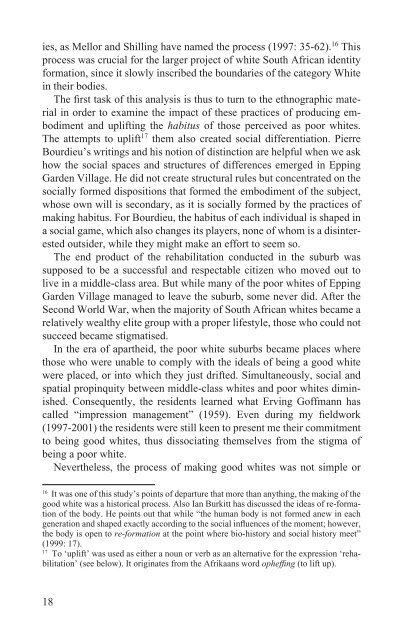The Making of a Good White - E-thesis - Helsinki.fi
The Making of a Good White - E-thesis - Helsinki.fi
The Making of a Good White - E-thesis - Helsinki.fi
You also want an ePaper? Increase the reach of your titles
YUMPU automatically turns print PDFs into web optimized ePapers that Google loves.
ies, as Mellor and Shilling have named the process (1997: 35-62). 16 This<br />
process was crucial for the larger project <strong>of</strong> white South African identity<br />
formation, since it slowly inscribed the boundaries <strong>of</strong> the category <strong>White</strong><br />
in their bodies.<br />
<strong>The</strong> <strong>fi</strong>rst task <strong>of</strong> this analysis is thus to turn to the ethnographic material<br />
in order to examine the impact <strong>of</strong> these practices <strong>of</strong> producing embodiment<br />
and uplifting the habitus <strong>of</strong> those perceived as poor whites.<br />
<strong>The</strong> attempts to uplift 17 them also created social differentiation. Pierre<br />
Bourdieu’s writings and his notion <strong>of</strong> distinction are helpful when we ask<br />
how the social spaces and structures <strong>of</strong> differences emerged in Epping<br />
Garden Village. He did not create structural rules but concentrated on the<br />
socially formed dispositions that formed the embodiment <strong>of</strong> the subject,<br />
whose own will is secondary, as it is socially formed by the practices <strong>of</strong><br />
making habitus. For Bourdieu, the habitus <strong>of</strong> each individual is shaped in<br />
a social game, which also changes its players, none <strong>of</strong> whom is a disinterested<br />
outsider, while they might make an effort to seem so.<br />
<strong>The</strong> end product <strong>of</strong> the rehabilitation conducted in the suburb was<br />
supposed to be a successful and respectable citizen who moved out to<br />
live in a middle-class area. But while many <strong>of</strong> the poor whites <strong>of</strong> Epping<br />
Garden Village managed to leave the suburb, some never did. After the<br />
Second World War, when the majority <strong>of</strong> South African whites became a<br />
relatively wealthy elite group with a proper lifestyle, those who could not<br />
succeed became stigmatised.<br />
In the era <strong>of</strong> apartheid, the poor white suburbs became places where<br />
those who were unable to comply with the ideals <strong>of</strong> being a good white<br />
were placed, or into which they just drifted. Simultaneously, social and<br />
spatial propinquity between middle-class whites and poor whites diminished.<br />
Consequently, the residents learned what Erving G<strong>of</strong>fmann has<br />
called “impression management” (1959). Even during my <strong>fi</strong>eldwork<br />
(1997-2001) the residents were still keen to present me their commitment<br />
to being good whites, thus dissociating themselves from the stigma <strong>of</strong><br />
being a poor white.<br />
Nevertheless, the process <strong>of</strong> making good whites was not simple or<br />
16<br />
It was one <strong>of</strong> this study’s points <strong>of</strong> departure that more than anything, the making <strong>of</strong> the<br />
good white was a historical process. Also Ian Burkitt has discussed the ideas <strong>of</strong> re-formation<br />
<strong>of</strong> the body. He points out that while “the human body is not formed anew in each<br />
generation and shaped exactly according to the social influences <strong>of</strong> the moment; however,<br />
the body is open to re-formation at the point where bio-history and social history meet”<br />
(1999: 17).<br />
17<br />
To ‘uplift’ was used as either a noun or verb as an alternative for the expression ‘rehabilitation’<br />
(see below). It originates from the Afrikaans word ophef<strong>fi</strong> ng (to lift up).<br />
18
















